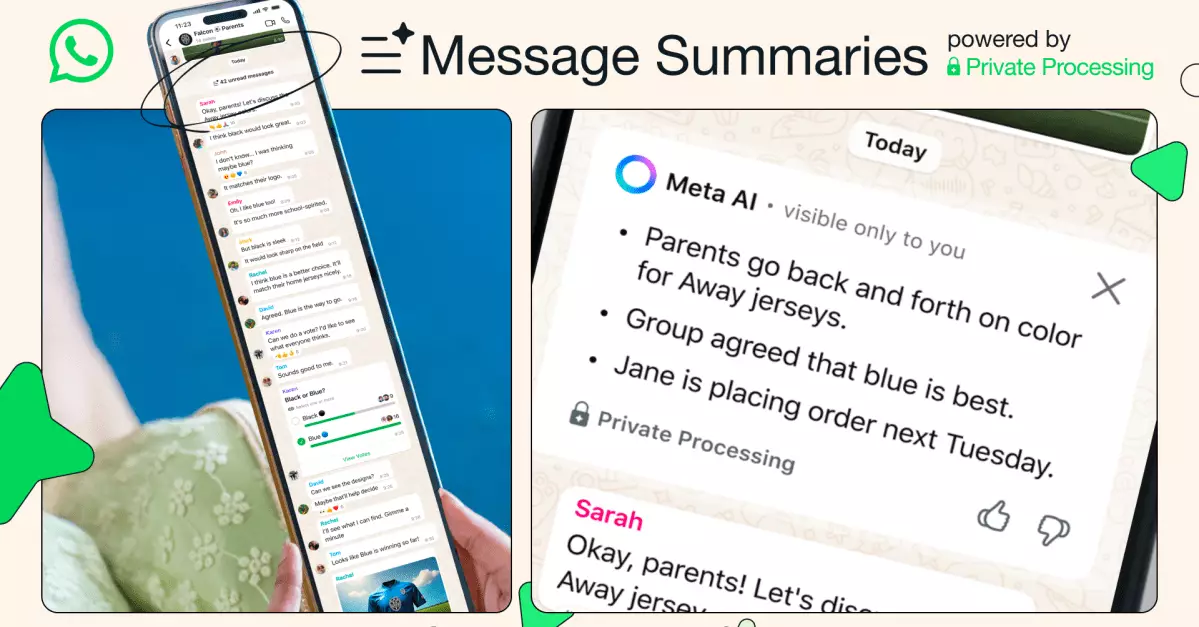Meta has ushered in a new era of artificial intelligence functionalities within WhatsApp, making it a notable player in the competitive landscape of communication apps. Among the latest features is an AI-driven summary tool designed to help users catch up on missed messages. With technology evolving rapidly, this feature represents another step in integrating AI into our daily interactions. However, it raises critical questions about privacy, accuracy, and user experience that cannot be overlooked.
Functionality and Accessibility
WhatsApp users in the United States will soon have the capability to simplify their communication by relying on AI-generated summaries of unread messages. Instead of sifting through countless threads, a simple tap will reveal a concise bulleted list of what has been missed. This feature, while seemingly efficient, has sparked reactions ranging from curiosity to concern among users. Introducing AI tools in personal communication implies a shift in how we interact, potentially replacing intimate discussions with automated interactions.
For many, the appeal of catching up quickly is significant, especially in the fast-paced world we inhabit. Yet, not every user is enthusiastic. Critics voice apprehension over relinquishing an element of personal touch in conversations. This feature offers efficiency but at what cost? Is it more beneficial to automate these reminders, or does it strip away authenticity from dialogue?
A Balancing Act: Privacy and Functionality
Privacy is a considerable concern with any form of data processing, particularly in a landscape filled with skepticism about data misuse. Meta insists that their “Private Processing” technology will prevent third parties from accessing messages that AI examines for summarization. The feature is disabled by default and can be further restricted using WhatsApp’s “Advanced Privacy” settings, allowing users some semblance of control in an increasingly automated environment.
Nevertheless, past experiences with AI initiatives—seen with Apple’s similar attempts—leave users wary. The initial rollout of AI-generated summaries was fraught with accuracy issues, casting doubt on Meta’s ability to deliver reliable and meaningful insights. Users are right to question: will these AI summaries keep the essence of our conversations intact, or will they miss key nuances?
Public Perception and User Experience
The addition of the Meta AI button within WhatsApp has drawn mixed reactions. While some appreciate the innovation, others express frustration over the permanence of AI features that cannot be easily toggled off. This has left a segment of users feeling cornered into using an AI functionality they did not expressly seek. It highlights a crucial aspect of user experience—what happens when features become obligatory rather than optional?
Moreover, the introduction of ads within WhatsApp, against the founders’ original promises, amplifies the dissatisfaction. Consumers prioritize privacy and user-friendly experiences, which Meta must consider if it aspires to maintain its user base. While innovations like AI-driven summaries may attract attention, failure to address user comfort could lead to significant backlash.
In essence, WhatsApp’s AI capabilities may enhance efficiency, but the implications of these advancements need thoughtful dialogue. Users find themselves at a crossroads, navigating between the conveniences of technology and the fundamental human experience of communication. The real challenge lies in ensuring that these innovations contribute positively while respecting the privacy and choices of every user. The excitement surrounding AI is palpable; however, careful consideration must accompany its implementation to foster trust and engagement.

